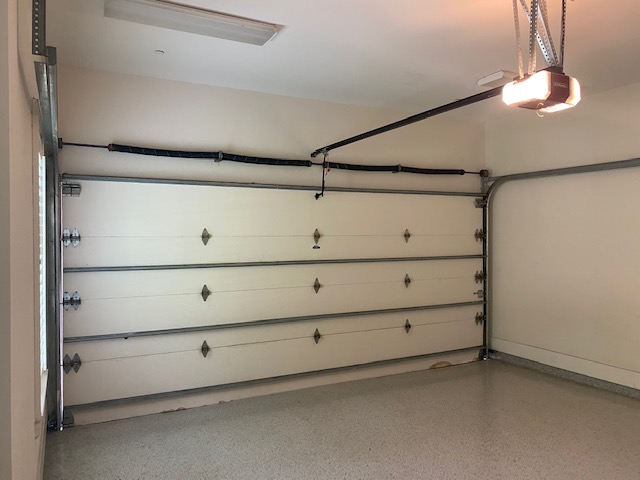Your garage door opener is one of those home components that you don’t think about until it stops working. When it comes time to replace or upgrade, you might find yourself overwhelmed by the variety of options available on the market. However, by considering your specific needs and understanding the different types of garage door openers, you can make an informed decision that will serve you well for years to come. In this blog post, we’ll guide you on how to choose the right garage door opener for your home.
Types of Garage Door Openers
There are four main types of garage door openers: chain drive, belt drive, screw drive, and direct drive. Here’s what you need to know about each:
- Chain-Drive Openers: This type of opener uses a chain to push or pull a trolley that moves your door up and down. They are usually the most affordable option, but they can be quite noisy, making them less ideal for homes where the garage is located beneath a living space.
- Belt-Drive Openers: Belt-drive openers function similarly to chain drives, but they use a rubber belt instead of a chain. This makes them much quieter than chain drives, though they are generally more expensive.
- Screw-Drive Openers: These openers use a threaded steel rod to move the trolley. They have fewer moving parts than chain or belt drives, which can make them more reliable and require less garage door repair maintenance. However, they can be noisier than belt drives.
- Direct-Drive Openers: These are the quietest and most expensive of the four types. The motor itself moves along a stationary chain, meaning there are even fewer moving parts than in a screw-drive opener.
Considerations When Choosing a Garage Door Opener
Once you understand the types of openers, there are several factors you should consider to ensure you choose the right one:
Power
Garage door openers typically come in three levels of horsepower: 1/3 hp, 1/2 hp, and 3/4 hp. The weight and size of your garage door will dictate the amount of horsepower you need. For a standard, double-car garage door, a 1/2 hp model usually suffices. However, if you have a particularly heavy or large door, you may need a 3/4 hp model.
Noise Level
If your garage is attached to your home or beneath living spaces, you may want to prioritize a quiet opener, such as a belt-drive or direct-drive model.
Safety Features
Modern garage door openers come with a variety of safety features. Look for an opener that comes with a rolling code feature, which changes your garage door’s code each time you use it, preventing potential thieves from hacking your code. Also, ensure your chosen opener has sensors that will stop and reverse the door if something is in its path.
Smart Technology
Many modern openers can connect to your home’s Wi-Fi, allowing you to control and monitor your garage door from your smartphone. This can be a convenient feature, especially if you often forget to close your garage door or if you need to let someone in while you’re not home.
Professional Installation vs. DIY
Finally, consider whether you want to install your garage door opener yourself or hire a professional for garage door repair. DIY installation can save you money, but it can also be time-consuming and tricky if you’re not handy. A professional can ensure your opener is installed correctly and quickly.
In conclusion, choosing the right garage door opener involves understanding the types of openers available and considering your specific needs and preferences. By considering the power, noise level, safety features, and smart technology capabilities, you can select the perfect garage door opener for your home.
Budget
Your budget will inevitably play a role in the decision-making process. Prices for garage door openers vary widely based on the type, features, and brand. Chain-drive openers are typically the most affordable, but they lack the quiet operation of belt-drive and direct-drive models. High-end models may feature built-in Wi-Fi, battery backup, and other advanced features. Weigh the cost against the features and benefits you are getting.
Brand Reputation
Not all garage door openers are created equal, and some brands have a better reputation for durability and customer service than others, especially when it comes to garage door repair. Look for brands with a history of good customer reviews and robust warranties. This can give you peace of mind knowing that the company stands behind its product.
Battery Backup
A power outage can leave you unable to open or close your garage door unless you have a battery backup system. If you live in an area prone to power outages, look for a garage door opener with a battery backup feature. This feature will keep your garage door opener operational, even when the power is out.
Lighting
Most garage door openers have built-in lights, which can be a significant advantage when you’re trying to navigate your garage in the dark. Consider the wattage of the light and whether the light points are adjustable to your preferred position.
Remote Control
Consider the type of remote controls that come with the opener. Some use a traditional clicker-style remote, while others use a wireless, keyless pad that you install outside the garage. Some can even be controlled by an app on your smartphone. Choose the type of remote that you find most convenient.
To wrap it up, when choosing the right garage door opener, it’s essential to consider your specific needs, the type of garage door you have, and the features that are most important to you. While it may seem like a lot to think about, taking the time to choose the right garage door opener can save you a lot of headaches in the future. So take your time, do your research, and you’ll find the garage door opener that fits your home perfectly.

Tips on How To Choose a Garage Door Opener That Works With Your Garage Door
Choosing a compatible garage door opener for your home requires careful consideration of several key factors. Here are some tips to guide you through the process:
- Evaluate Your Garage Door: The first thing you need to consider is the type of garage door you have. The size, weight, and material of your door can significantly affect the type of opener you need. For example, a heavier wooden or insulated double door will require a more powerful opener compared to a lighter single aluminum door.
- Consider the Drive Type: As mentioned earlier, there are four main types of garage door openers – chain drive, belt drive, screw drive, and direct drive. Chain drives are typically louder but more affordable, while belt drives are quieter but more expensive. Screw drives offer a balance between noise and cost but may require more maintenance. Direct drives are the quietest and most reliable, but they’re also the most expensive.
- Power Level: Garage door openers come in different power levels, typically 1/3 horsepower (hp), 1/2 hp, and 3/4 hp. A heavier door will require more horsepower, so it’s essential to match the opener’s power level with your door’s weight and size.
- Check for the Latest Features: Modern garage door openers come with several handy features, such as built-in Wi-Fi, battery backup, auto-close functionality, and smartphone control. Depending on your needs and budget, you may want to consider these features when choosing your opener.
- Safety Measures: Garage door openers should have essential safety features, such as an auto-reverse function that stops the door if it detects an object in its path and a manual release feature that allows you to operate the door manually in case of a power outage.
- Noise Level: If your garage is attached to your home or located under a bedroom, a quieter model like a belt-drive or direct-drive opener would be a better choice to minimize noise disturbance.
- Compatibility with Your Home’s Infrastructure: Some garage door openers, particularly smart ones, require a good Wi-Fi signal in the garage to function optimally. If your home Wi-Fi doesn’t extend to the garage, you may need a Wi-Fi extender, or you might opt for a traditional, non-smart opener.
- Professional Installation vs. DIY: Consider whether you’re comfortable installing the opener yourself or if you’d prefer to hire a professional for garage door repair. Some models are easier to install than others, and professional installation can ensure the job is done correctly and safely.
- Warranty: Check the warranty period of the garage door opener. A longer warranty period is generally an indicator of the manufacturer’s confidence in its product’s durability.
- Read Reviews: Before making your final decision, read reviews of the opener to see what other users have to say about its performance, reliability, and ease of installation. This can provide valuable insights and help you avoid potential issues.
By carefully considering these factors, you can choose a compatible garage door opener that meets your needs and ensures smooth and reliable operation for years to come.
Choose The Trusted Garage Door Company
First Call Garage Doors is a reliable garage door company that has built a strong reputation. We have been in the business for many years and have accumulated extensive industry knowledge and expertise. We offer a wide selection of high-quality garage doors and openers, professional installation and repair services, prioritizing safety first, competitive pricing, and positive reviews from satisfied customers, including top-notch garage door repair solutions.
Our technicians follow strict safety protocols during installations and repairs, and we offer garage doors and openers with the latest safety features to protect you and your family. We also offer competitive pricing and transparent quotes without hidden fees, ensuring you get value for your money.
If you’re looking for a trusted garage door company, First Call Garage Doors is an excellent choice. Their commitment to customer satisfaction, quality products, and professional service makes them a reliable partner for all your garage door needs.
